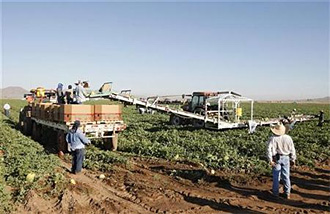
|
 |
 |
 Americas & Beyond | June 2008 Americas & Beyond | June 2008  
US Border Farmers Seek Change on Guest Workers
 Tim Gaynor - Reuters Tim Gaynor - Reuters
go to original


| | Mexican migrant workers pick and load watermelons in Dome Valley near Yuma, Arizona June 18, 2008. (Reuters/Rick Scuteri) | | |
Yuma, Arizona - Mexican migrant worker Fidel Castaneda hunkers down, brushes the sweat from his eyes and moves swiftly along the sun-blasted row cutting vines as the temperatures rises to 111 Fahrenheit (44 C).

"Watermelons are tough, because of the heat," he said.

Behind him, a woman wearing a straw hat, long sleeves and a cotton scarf slaps produce labels on the fruit, as other workers follow through lifting them into a trailer.

The job is one of the toughest in agriculture, and farmers in the irrigated desert around Yuma, Arizona, which produces around 90 percent of America's winter produce, struggle to fill them with American workers in this election year.

Each morning some 25,000 migrant workers like Castaneda, 54, get up in the dark in Mexico and cross over the border to work in the scorching fields. Growers say the sector has jobs for another 5,000 at peak times.

Many U.S. farmers, from dairy farmers to cattle ranchers and produce growers, complain that they cannot find enough American workers to fill many key jobs.

Growers in the sweltering U.S. borderlands are looking to the next president of the United States to create a guest worker program to help them find workers.

"Unlock the door for us. Let us have access to this work force that take jobs that Americans simply won't take, and then let's go from there," said Paul Muthart, general manager of Pasquinelli Produce Co, one of the largest produce growers in the area.

WORKER SHORTAGE

Immigration is a hot-button issue in the United States. Many Americans are worried about security on the porous Mexico border, divided over what to do with some 12 million illegal immigrants living in the shadows and split on the merits of opening the doors to more legal workers.

Both Republican candidate John McCain and Democrat Barack Obama favor tighter border security, granting many illegal immigrants legal status, and allowing screened guest workers to fill jobs not taken by Americans - a stance shared by farmers.

"We think it is appropriate to offer the jobs to American workers first," said Muthart, whose firm pays above the $6.90 minimum wage in Arizona and offers workers benefits including health care, paid vacations and profit sharing.

"But this is a very remote area, and how are you going to get 5,000 people to respond to a classified ad to work out here in the elements?" he says.

Instead, he and other farmers across the Yuma area, which is irrigated by the waters of the Colorado River, bus in workers who cross legally through the port of entry from San Luis, Mexico each day.

Starting shortly after 5 a.m., Castaneda and his co-workers lift more than 30 tons of watermelons from each of more than 300 acres under cultivation, swilling water as they go, and taking frequent breaks in the shade.

Even so, short-handed and with a limited window to lift the fast-ripening crop and get it fresh to market, much of the produce is simply wasted.

"As much as a fifth of our produce is left to rot because we don't have enough workers ... and in the end it's the consumer that bears the cost," Muthart said.

PROSPECTS FOR CHANGE

In recent months, prospects for a breakthrough on immigration legislation have been poor.

A comprehensive overhaul of immigration laws - including plans for a guest worker program - was killed off by Republicans in the U.S. Senate a year ago.

Last month, Sen. Dianne Feinstein, a California Democrat, was forced to pull temporary legislation that would have given protected status to some undocumented farm workers from an Iraq War supplemental funding bill.

However, movement on the issue may be more likely after the general election in November, with either an Obama or a McCain presidency, say immigration reform advocates.

"If you look at their histories, both Senator McCain and Obama have been very, very supportive of sensible reforms ... and of agricultural reforms that will take this problem head on," said Craig Regelbrugge, co-chair of the Agriculture Coalition for Immigration Reform.

Farmers like Muthart say the borderlands, where Mexican workers can commute to work in the morning and return to their homes at night, would be a good place to start any such program

Working at a steady rhythm in the stifling field framed by jagged mountains, Mexican Guadalupe Gonzalez says she has plenty of relatives and neighbors ready and willing to cross the border to work each day if such a program were approved.

"They want the jobs," she said. "All they need are the papers."

(Editing by Cynthia Osterman) | 
 | |
 |



